If you’re thinking about buying a sedan or already own one, it’s good to know what kind of gas mileage you should expect out of one.
This article will go over the average and median fuel economy for all sedans, including different sedan categorizations (full-size, mid-size, compact, luxury, etc.), and how sedans compare to other automobiles.
What is the Fuel Economy for Sedans?
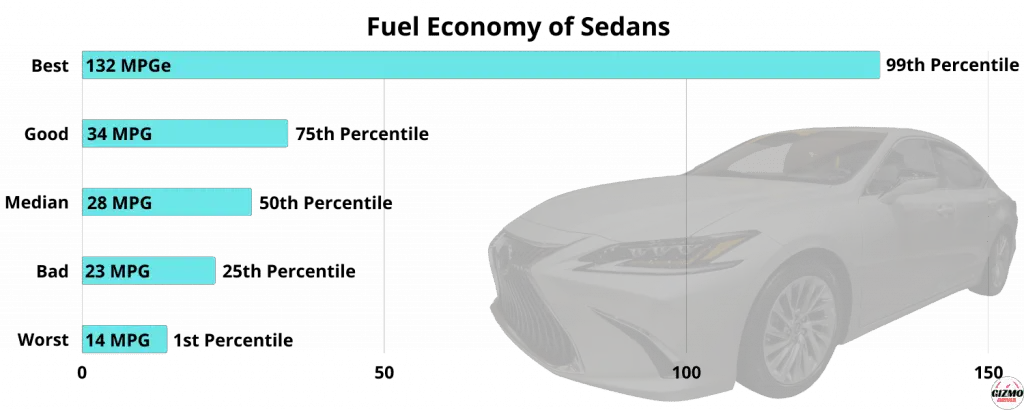
The average fuel economy of a sedan is 36.8 miles per gallon (MPG) and the median is 28 MPG. This is 8 MPG more than the average for all cars. Sedans are, on average, 27% more efficient than the average automobile.
However, the average figure is greatly skewed by electric and plug-in hybrid sedans, which could get well above 90 MPG! So a better measure would be the median, which is the 50th percentile.
The median fuel economy for a sedan is 28 miles per gallon, which is 5 MPG, or 21.7% better than the median for all automobiles.
As more electric and plug-in hybrid sedans are introduced into the market, we can expect these figures to go up year after year.
What is a good fuel economy for a Sedan?
Our general guideline for determining whether a car has a good or bad fuel economy is to look at the 1st, 25th, 50th, 75th, and 99th percentile fuel economies for the given vehicle category.
34 MPG or higher is a good MPG for a sedan, which is the 75th percentile fuel economy for sedans. 23 MPG and lower is bad for a sedan while 24-33 MPG is decent and normal.
| Percentile | Car | MPG |
| 99th | Tesla Model 3 RWD | 132 |
| 75th | Volkswagen Jetta 1.5L 4 cylinder | 34 |
| Median (50th) | Kia K5 AWD 1.6L 4 cylinder | 28 |
| 25th | BMW 740i xDrive Sedan 3.0L 6 cylinder | 23 |
| 1st | Rolls Royce Ghost 6.7L V12 | 14 |
Fuel cost of sedans
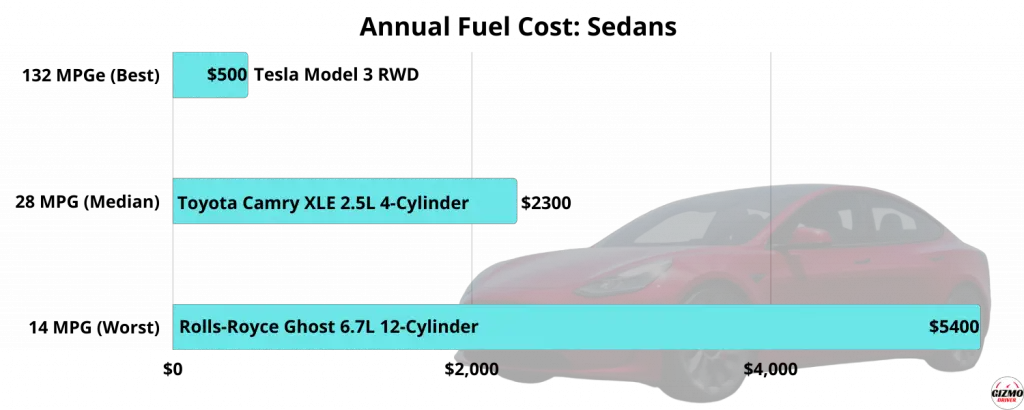
The average fuel cost for a sedan is generally between $1600-2600$, depending on the price of gas. The annual fuel cost for a sedan can range anywhere from $500 to $5400 per year.

As seen in this chart, the fuel cost to fuel economy ratio is not linear. The most significant changes in fuel costs are generally in the lower MPG ranges.
As you approach the MPG ranges in which plug-in hybrids and electric sedans operate, the cost savings from higher MPGs become less significant.
The rest of the article will provide more nuanced fuel economy figures for many of the different categorizations.
Fuel Economy by Sedan Size – Full-Size/Mid-Size/Small Sedans
The size and weight of a sedan will greatly influence its fuel economy. Sedans are usually classified into 3 different market classes: full-size, mid-size, and compact/small.
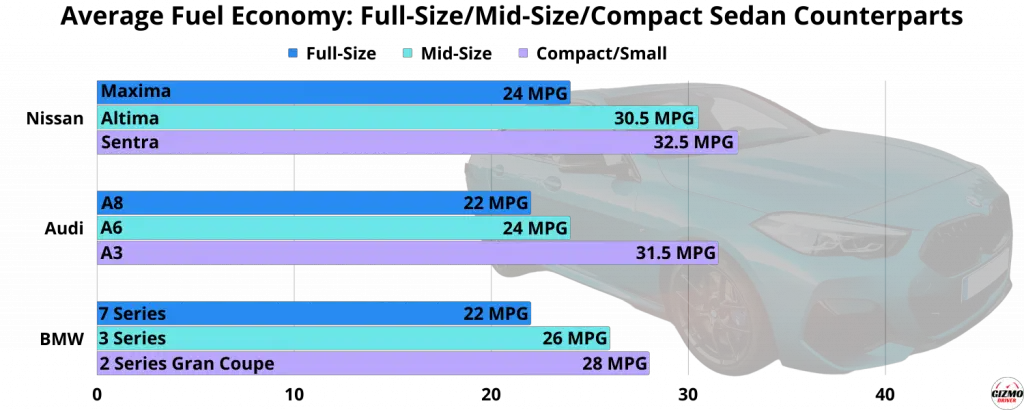
What is the fuel economy of full-size sedans?
Full-size sedans have an average fuel economy of 31 MPG, while the median MPG is significantly lower, at 21 MPG.
The reason for the large gap between the median and average figures is that full-size sedans are by far the least common type of sedan, which makes for a less stable average. The full-size segment also has the largest percentage of electric vehicles, which affects the average significantly.
Full-size sedans are generally only seen in the luxury market. Today, the only non-luxury full-size sedans sold in the US are the Toyota Avalon, Nissan Maxima, and Dodge Charger.
Full-size sedans are the least efficient type of sedan. They are heavier and typically have larger engines fitted into them.
Good fuel economy for a full-size sedan:
A good fuel economy for a full-size sedan is 24 miles per gallon or higher. 24 MPG is the 75th percentile for full-size sedans.
A bad fuel economy is the 25th percentile, which is 19 MPG or lower.
Most/least fuel-efficient full-size sedans:
| Car | Least Efficient Trim (MPG) | Median (MPG) | Most Efficient Trim (MPG) |
| Lucid Air | 111 | 119 | 131* |
| Porsche Taycan | 24 | 24 | 24 |
| Chrysler 300 | 19 | 21* | 23 |
| Genesis G90 | 18 | 19 | 20 |
| Rolls Royce Ghost | 14* | 14 | 14 |
The Lucid Air G Touring 19-inch is the most fuel-efficient full-size sedan on the market. At 131 MPGe, the Air G Touring is 322% more efficient than the average full-size sedan.
The least fuel-efficient sedan is the Rolls Royce Ghost, which gets 14 MPG. The Rolls-Royce Ghost is more than 9 times less fuel-efficient than the most fuel-efficient sedan.
What is the fuel economy of mid-size sedans?
The average fuel economy of mid-size sedans is 34.3 MPG. The average mid-size sedan is 18% more fuel-efficient than the average automobile. The median MPG is lower, at 26 miles per gallon.
Mid-size sedans are the most popular class of sedans for both the standard and luxury consumer markets, with the Toyota Camry being both the most popular sedan and mid-size sedan.
Good fuel economy for a mid-size sedan:
A good MPG for a mid-size sedan is 36 miles per gallon or higher, which is the 75th percentile for mid-size sedans.
Relative to other mid-size sedans, 24 MPG or lower is considered bad fuel economy.
Most/least fuel-efficient mid-size sedans:
| Car | Least Efficient Trim (MPG) | Median (MPG) | Most Efficient Trim (MPG) |
| Tesla Model 3 | 111 | 131 | 132* |
| Honda Accord | 26 | 33 | 47 |
| BMW 5 Series | 17 | 26* | 64 |
| Acura TLX | 21 | 24 | 25 |
| Cadillac CT5 | 15* | 21 | 27 |
The most fuel-efficient mid-size sedan is the Tesla Model 3. It has an incredible fuel economy of 132 MPGe, beating out all-electric vehicles to be the number 1 most fuel-efficient vehicle EV sold in the market.
The BMW 5-Series is at the 50th percentile of fuel efficiency for mid-size sedans, at 26 miles per gallon.
The least fuel-efficient mid-size sedan sold in 2022-2023 is the 6.2L V8 Cadillac CT5 V. It achieves a fuel efficiency of 15 MPG, which is less than half of that of the average of 34.3 MPG for its segment (mid-size sedans).
What is the fuel economy of small sedans?
Small sedans and/or compact cars have an average fuel economy of 39.5 MPG. The median fuel economy is 32 MPG, which is 9 MPG higher than the median for all vehicles.
Small/compact sedans are among the most fuel-efficient automobile categories, if not the most.
The reason why small sedans are so fuel-efficient is mainly that they were built for efficiency. Compact cars are lightweight, have a minimum number of extra features, and are usually fitted with small engines.
Small cars are often catered to consumers looking to save the most money on their vehicles.
Good fuel economy for a compact sedan:
A good fuel economy for a small or compact sedan is 36 miles per gallon or higher, which is the 75th percentile for small sedans. A bad fuel economy would be 29 miles per gallon or lower.
Most/least fuel-efficient small/compact sedans:
| Car | Least Efficient Trim (MPG) | Median (MPG) | Most Efficient Trim (MPG) |
| Hyundai Ioniq | 55 | 59 | 119* |
| Kia Rio | 36 | 36 | 36 |
| Nissan Sentra | 32 | 32* | 33 |
| Mazda 3 | 26 | 29 | 31 |
| Subaru WRX | 21* | 21.5 | 22 |
At 119 miles per gallon, the Hyundai Ioniq Plug-in Hybrid, among all compact sedans, has the highest fuel economy. It is 3 times more fuel-efficient than the average compact sedan.
The Subaru WRX is the least fuel-efficient sedan, with a combined MPG of 21.
Gas Mileage in Luxury Sedans vs Standard Sedans
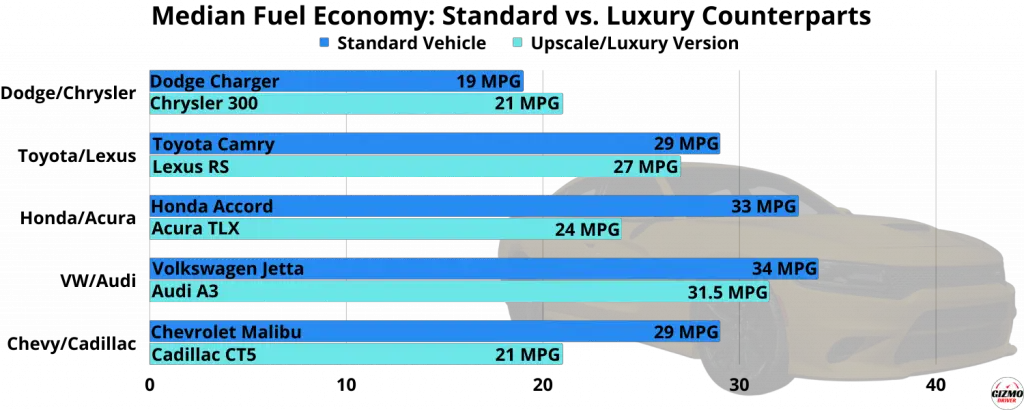
The average fuel economy for a luxury sedan is 34.8 MPG and the median fuel economy is 24 MPG. Luxury sedans get, on average, 4 miles per gallon less than their standard counterparts.
Are luxury sedans more fuel-efficient than non-luxury?
In general, luxury sedans are less fuel-efficient than their standard counterparts. Luxury cars are typically larger and heavier, with larger engines.
Standard sedans are designed for customers who want to save money wherever they can, which may explain why they are much more fuel-efficient than luxury ones.
Luxury sedans are typically targeted at customers who are willing to pay extra for premium features such as advanced technology, more durable materials, suspension, increased performance, and improved handling capabilities, all of which significantly decrease the fuel economy.
Good fuel economy for a luxury sedan:
A good fuel economy for a luxury sedan is 31.5 miles per gallon or higher. A bad MPG would be anything lower than the 25th percentile, which is 19 MPG.
Most/least fuel-efficient luxury sedans:
| Car | Least Efficient Trim (MPG) | Median (MPG) | Most Efficient Trim (MPG) |
| Tesla Model 3 | 111 | 131 | 132 |
| Audi A3 | 31 | 31.5 | 32 |
| Cadillac CT4 | 18 | 24* | 27 |
| Porsche Panamera | 17 | 19 | 52 |
| Rolls Royce Ghost | 14 | 14 | 14 |
The most fuel-efficient luxury sedan is the Tesla Model 3.
The Cadillac CT4, at 24 MPG, is a luxury sedan with a median efficiency (50th percentile). Half of the luxury sedans are less fuel-efficient, while the other half are more fuel-efficient.
Fuel Economy by Powertrain – Sedans
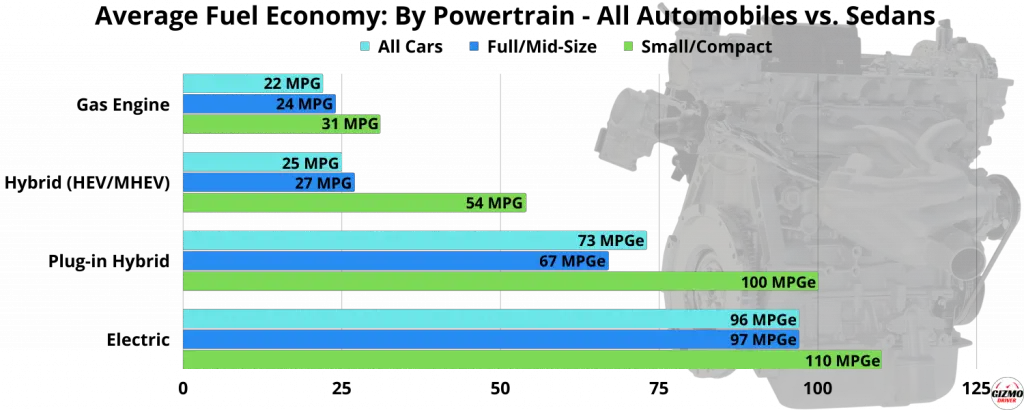
The fuel economy of a sedan is largely dependent on its powertrain. A plug-in hybrid can be 3 times more fuel-efficient than a conventional gasoline car, while an EV can be 4 times more efficient!
How do engine size and power affect the fuel efficiency of a sedan?
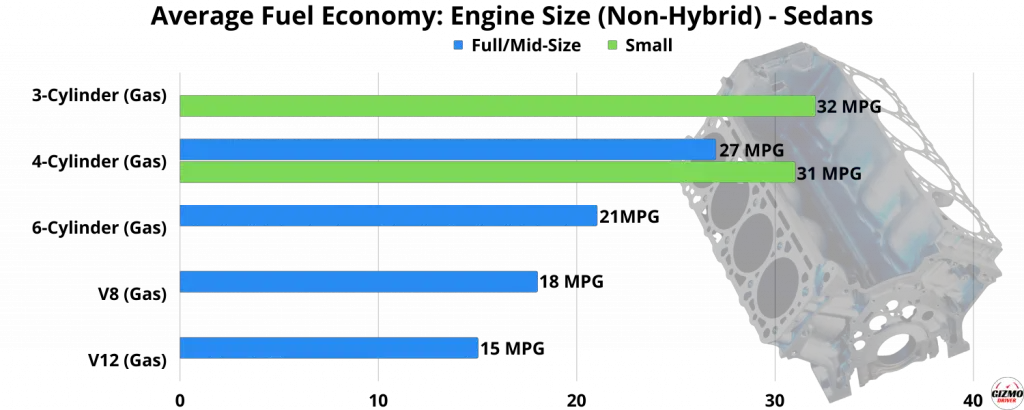
The size of the engine has a significant impact on fuel economy. As seen in the table above, for every two-cylinder increase in a conventional gas engine car, the fuel economy decreases by 15% to 35%.
How do turbos affect fuel economy?
Turbocharging doesn’t directly make your car use less gas, but it does let your engine make more power without using more gas. In turn, turbos indirectly save fuel by letting the engine make the same amount of power with less fuel.
As a result, manufacturers can fit smaller and more fuel-efficient turbocharged engines into cars that would have otherwise needed a larger engine to achieve the same amount of power from a naturally aspirated engine.
For example, the Honda Civic LX trim has a 2.0L 4-cylinder engine with an average fuel economy of 35 MPG. However, the Touring trim has a smaller, more fuel-efficient (36 MPG), 1.5L 4-cylinder engine, yet it has more power because it is turbocharged.
3-cylinder gas sedan
Currently, the only 3-cylinder gas sedan is the Mitsubishi Mirage G4 1.2L. It has an average combined fuel economy of 36 MPG and a city/highway fuel economy of 34/40.5 MPG.
4-cylinder gas sedans
The average fuel economy for a 4-cylinder sedan is 29 MPG, while the median MPG is 26 MPG. The average 4-cylinder sedan is more than 30% more fuel-efficient than the average gas vehicle.
A good fuel economy for a 4-cylinder gas sedan would be 32 MPG miles per gallon or higher. A bad fuel economy would be anything below 26 MPG, which is within the 25th percentile for 4-cylinder sedans.
| Percentile | Car | MPG |
| 99th | Hyundai Elantra 2.0L 4 cyl | 37 |
| 75th | Kia K5 1.6L 4 cyl | 32 |
| Median (50th) | Volvo S60 B5 AWD 2.0L 4 cyl | 28 |
| 25th | Mercedes-Benz E350 2.0L 4 cyl | 26 |
| 1st | Subaru WRX 2.4L 4 cyl | 21 |
6-cylinder sedans
6-cylinder gas sedans have an average gas mileage of 21.4 miles per gallon and a median of 21 miles per gallon. On average, 6-cylinder gas sedans are 2.5% less fuel-efficient than the average conventional gas vehicle.
A good fuel economy for a 6-cylinder sedan is anything above 23 MPG, which is the 75th percentile of 6-cylinder gas sedans. 23–20 MPG is a normal MPG for a 6-cylinder sedan.
A bad fuel economy would be an MPG lower than 20, which is the 25th percentile fuel economy.
| Percentile | Car | MPG |
| 99th | Lexus ES 350 3.5L 6 cyl | 26 |
| 75th | Chrysler 300 3.6L 6 cyl | 23 |
| Median (50th) | Genesis G70 RWD 3.3L 6 cyl | 21 |
| 25th | Alfa Romeo Giulia 2.9L 6 cyl | 20 |
| 1st | BMW M3 Competition M xDrive Sedan 3.0L 6 cyl | 18 |
MPG difference between 4-cylinder and 6-cylinder sedans
A four-cylinder sedan gets 28.9 miles per gallon on average, while a six-cylinder sedan gets 21.4 miles per gallon on average. That’s a difference of 35% in fuel economy.
However, because this figure includes all sedans, a better measure would be to look at the same models with 4-cylinder and 6-cylinder trims.
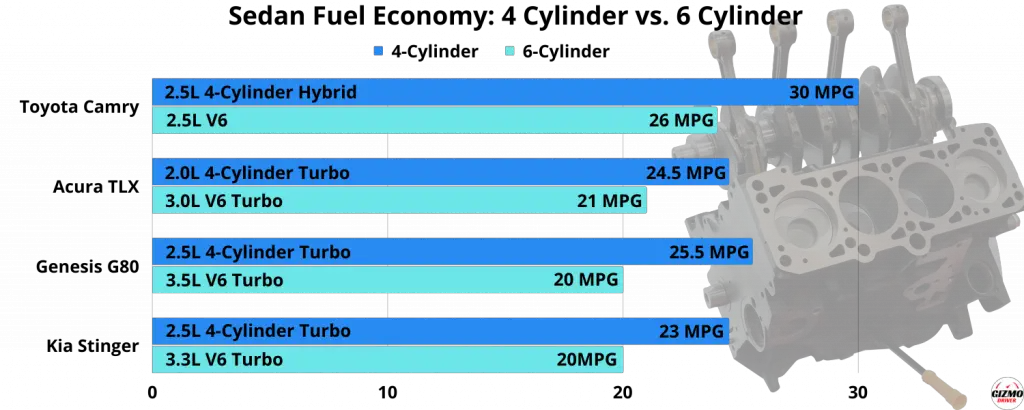
As shown in the table, 4-cylinder trims are around 3-6 MPG more fuel-efficient than 6-cylinder trims in the same sedan model, despite being less powerful.
V8 gas sedans
V8 sedans get an average combined fuel economy of 17.6 miles per gallon and a median of 17 miles per gallon. V8 gas sedans are 19.5 percent less fuel-efficient than conventional gas vehicles on average.
Anything above 19 MPG, or the 75th percentile, is considered good fuel economy for a V8 sedan. For a V8 sedan, 19-17 MPG is typical.
A fuel economy of less than 17 MPG, which is the 25th percentile, is considered poor.
| Percentile | Car | MPG |
| 99th | BMW M550i xDrive 4.4L V8 | 20 |
| 75th | Dodge Charger 5.7L V8 | 19 |
| Median (50th) | Genesis G90 AWD 5.0L V8 | 18 |
| 25th | Porsche Panamera GTS 4.0L V8 | 17 |
| 1st | Cadillac CT5 V 6.2L V8 | 15 |
How drivetrain affects gas mileage – RWD vs. FWD vs. AWD/4WD in sedans
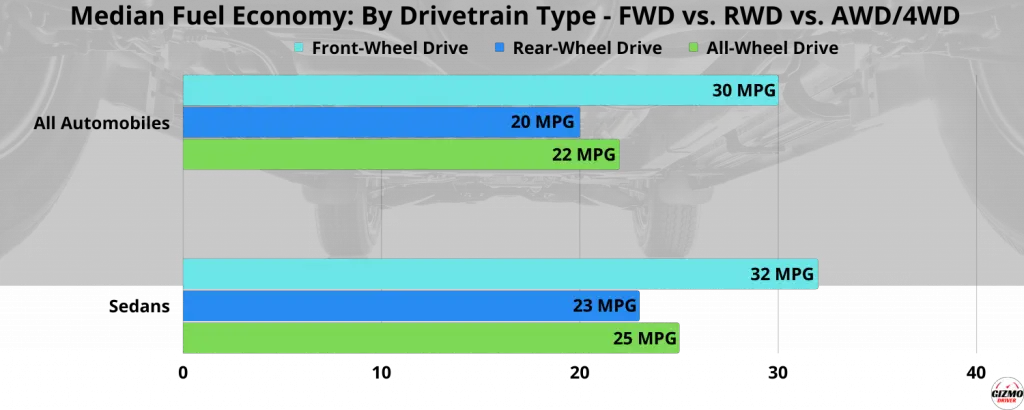
In general, all-wheel drive is the least fuel-efficient drivetrain mode for a car. Front-wheel drive is the most efficient type of drivetrain, followed by rear-wheel drive.
The median fuel economy for a rear-wheel-drive sedan or any other automobile is the lowest, as shown in the table above. This is because most, if not all, rear-wheel-drive sedans are performance vehicles with larger engines.
On average, all-wheel-drive reduces fuel economy by 3% to 10%, or 1-2 MPG, compared to its rear-wheel or front-wheel-drive counterparts.
The Efficiency of Hybrid and Electric Powered Sedans
Mild hybrid sedans (MHEV)
Sedans that have mild-hybrid (MHEV) systems have an average fuel economy of 25.1 MPG and a median fuel economy of 25 MPG. Most mild-hybrid sedans get between 27 and 22 miles per gallon.
A good fuel economy for a mild hybrid sedan is 27 MPG or higher, which is the 75th percentile for mild hybrid sedans. A bad fuel economy would be in the 25th percentile of MHEV sedans, which is anything under 22 MPG.
| Percentile | Car | MPG |
| 99th | Audi A3 2.0L 4 cyl | 32 |
| 75th | Mercedes-Benz C300 4matic 2.0L 4 cyl | 27 |
| Median (50th) | Lexus LS 500h 3.5L 6 cyl | 25 |
| 25th | Audi A8 L quattro 3.0L 6 cyl | 22 |
| 1st | Audi RS 7 4.0L 8 cyl | 17 |
Hybrid sedans (HEV)
The average fuel economy for a hybrid (HEV) sedan is 49.7 MPG, and the median fuel economy for a hybrid sedan is 50 MPG.
The average full hybrid (HEV) fuel economy for a sedan is almost double that of the average for a sedan with a mild-hybrid (MHEV) system, at 49.7 MPG compared to 25.1 MPG. However, keep in mind that most hybrid sedans are fitted with much smaller engines than mild-hybrid sedans.
52 MPG or higher is an excellent gas mileage for a hybrid sedan. Anything between 52-46 MPG is normal for a hybrid sedan.
Bad fuel economy for a hybrid sedan would be in the 25th percentile, at 46 MPG or under.
| Percentile | Car | MPG |
| 99th | Hyundai Ioniq Blue 1.6L 4 cyl | 59 |
| 75th | Honda Insight 1.5L 4 cyl | 52 |
| Median (50th) | Hyundai Elantra Hybrid 1.6L 4 cyl | 50 |
| 25th | Toyota Camry Hybrid SE/XLE/XSE 2.5L 4 cyl | 46 |
| 1st | Toyota Avalon Hybrid 2.5L 4 cyl | 43 |
Plug-in hybrid sedans (PHEV)
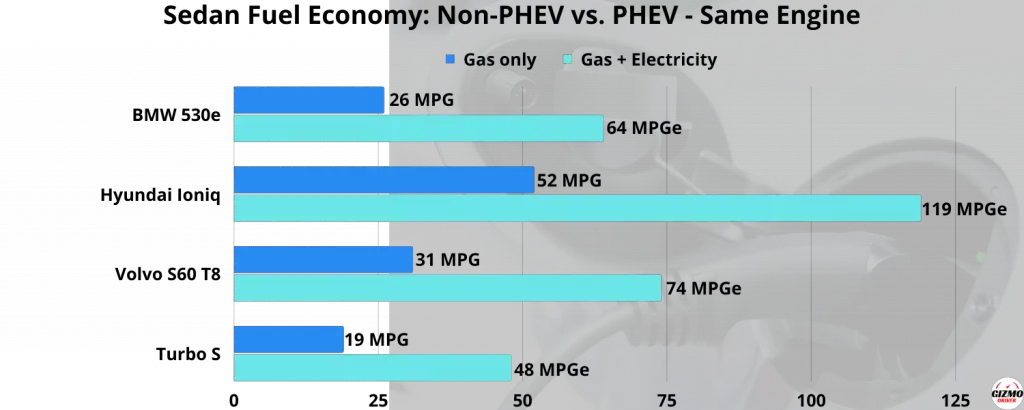
The average fuel economy for a plug-in hybrid sedan is 69.8 MPG. The median is 66 MPG. The median plug-in hybrid sedan is nearly 3 times as fuel-efficient as the median car. Most plug-in hybrid sedans will do between 74 and 52 miles per gallon (75th to 25th percentile).
In general, a plug-in hybrid sedan is 2-3 times more fuel-efficient than a same-model sedan without a plug-in hybrid system.
A good fuel economy for a plug-in hybrid is 74 MPG or higher. A bad fuel economy would fall under the 25th percentile for plug-in hybrid sedans, which is anything under 46 MPG.
| Percentile | Car | MPGe |
| 99th | Toyota Prius Prime 1.8L 4 cyl | 133 |
| 75th | Volvo S60 T8 AWD Recharge ext. Range 2.0L 4 cyl | 74 |
| Median (50th) | Volvo S90 T8 AWD Recharge ext. Range 2.0L 4 cyl | 64 |
| 25th | Porsche Panamera 4 E-Hybrid/Exec/ST 2.9L 6 cyl | 52 |
| 1st | Bentley Flying Spur Hybrid 2.9L 6 cyl | 46 |
The efficiency of EV sedans
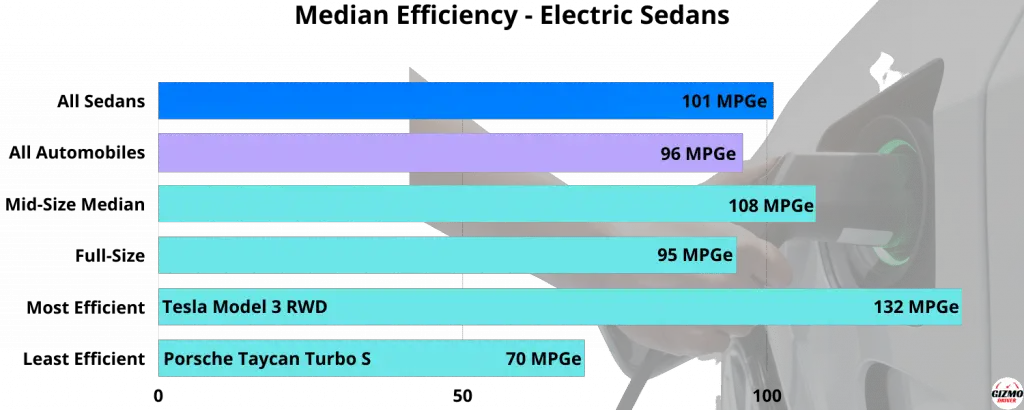
The average efficiency for an electric sedan is 33 kWh/100mi, or 101.6 MPGe. Between 116 MPGe and 82 MPGe is generally an acceptable fuel economy for an EV sedan, with the median being 101 MPGe.
The median electric sedan is 5% more efficient than the median electric automobile and 4.4 times more efficient than the median automobile.
A good MPGe for an electric sedan would be between the 75th and 99th percentiles, at 116 MPGe or higher (29 kWh/100mi or lower). A bad efficient rating would be between the 1st and 25th percentile, 82 MPGe or lower (41 kWh/100mi or higher).
| Percentile | Car | MPGe |
| 99th | Tesla Model 3 RWD | 132 |
| 75th | Lucid Air Dream R AWD 21in Wheels | 116 |
| Median (50th) | Tesla Model S Plaid 21in Wheels | 101 |
| 25th | Audi e-Tron GT | 82 |
| 1st | Porsche Taycan Turbo S | 70 |
Fuel Economy of Sedans vs. Other Automobiles
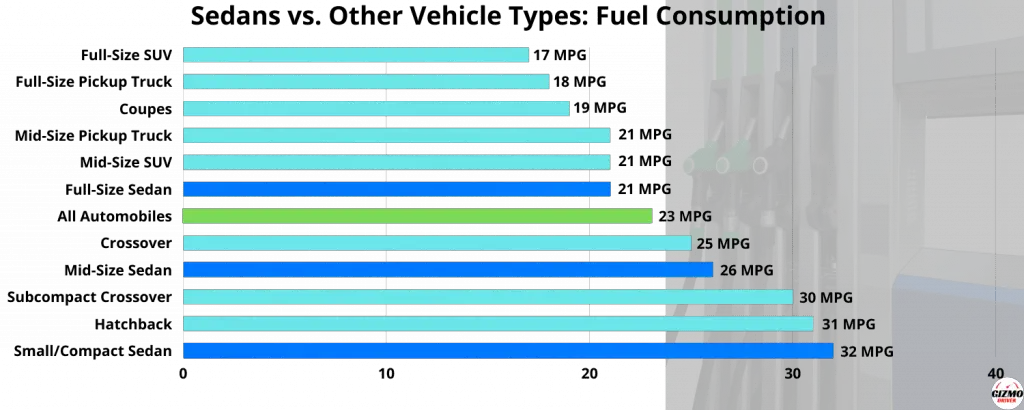
Sedans are one of the most fuel-efficient types of cars you can buy. While full-size sedans are below average in terms of fuel economies, small/compact sedans are the most fuel-efficient automobile type, followed by hatchbacks.
Are sedans more fuel-efficient than other types of automobiles?
Sedans are 27% more fuel-efficient than all other cars. The fuel economy of sedans is beaten only by hatchbacks, which have a median fuel economy of 31 MPG, 3 miles per gallon higher than the median fuel economy for all sedans.
Sedans vs Hatchbacks
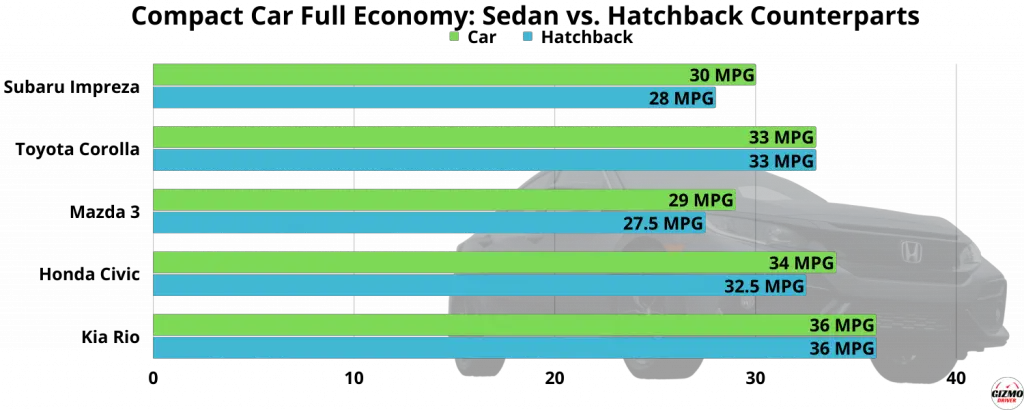
The median fuel economy for a hatchback is 31 MPG, while the median for a small sedan is 32 MPG.
Sedans are, on average, 1-2 MPG more fuel-efficient than their hatchback, same-model counterparts. This is because sedans are slightly more aerodynamic than their hatchback counterparts.
Sedans vs SUVs
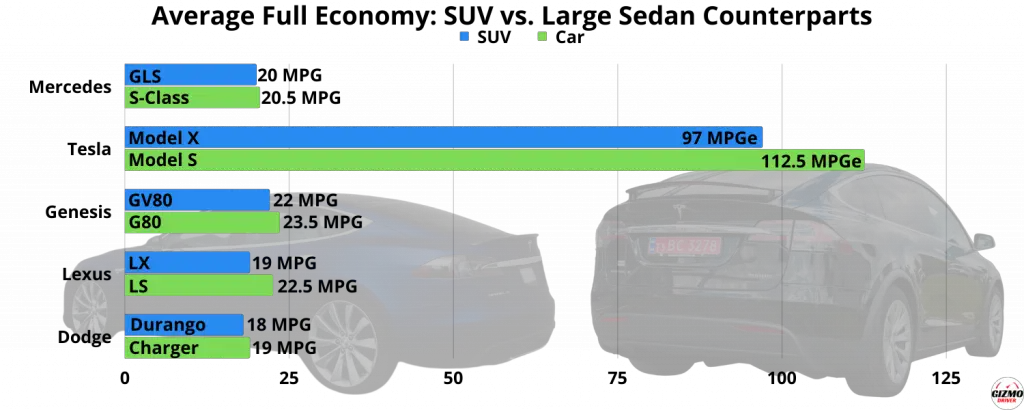
The average fuel economy for full-size sedans is higher than that of SUVs. However, the median fuel economy for full-size sedans and SUVs (both mid-size and full-size) are the same, at 21 MPG.
Full-size sedans are slightly more fuel-efficient than their same-brand SUV counterparts. While most of them share many of the same platforms, the difference in fuel economy is mostly due to the difference in weight.
See our article about the average MPG for SUVs here.
Sedans vs Crossovers (Compact SUVs)
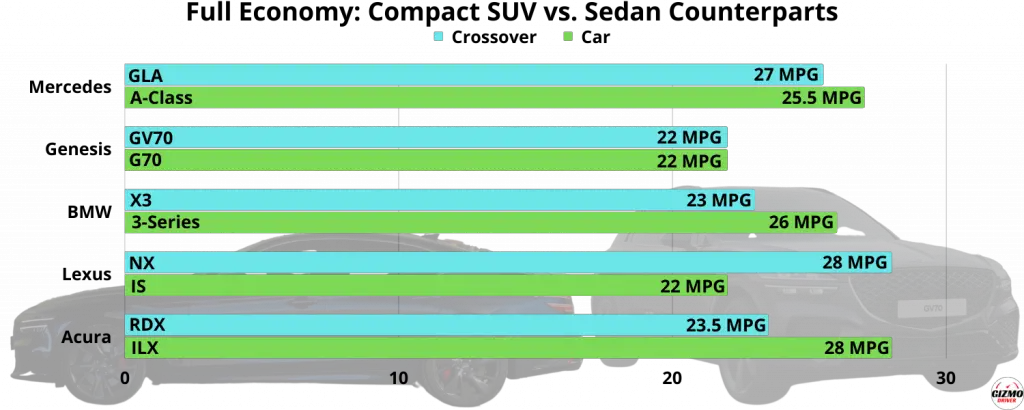
Sedans are more fuel-efficient than crossovers. The average fuel economy for a sedan is 36.8 MPG, while the average for crossovers is 32.8 MPG. However, the median sedan is only 1 MPG better than the median crossover (28 MPG and 27 MPG).
Between sedan-crossover counterparts within the same brand, sedans are usually 5% to 20% more fuel-efficient than their crossover counterparts, which share many of the same platforms.
See our article about the average MPG for crossovers here.
Sedans vs Coupes
Sedans are far more fuel-efficient than coupes are. At 28 miles per gallon, the median sedan is 47% more fuel-efficient than the median coupe, which does 19 miles per gallon.
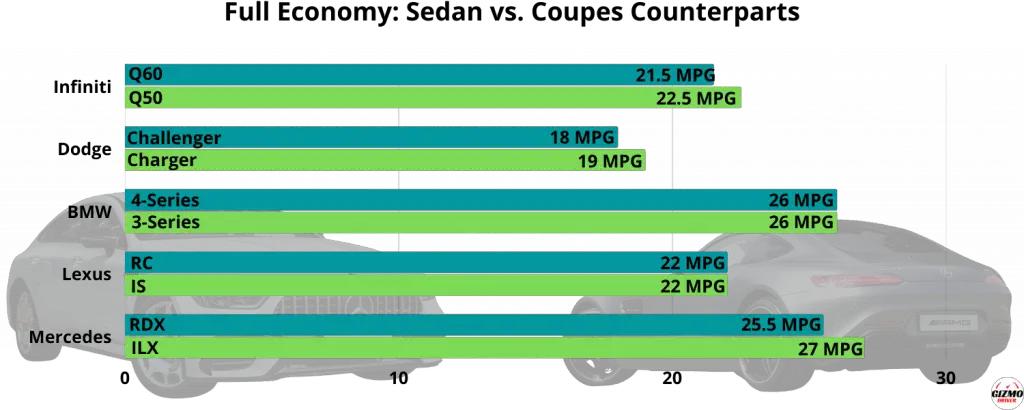
However, there is little difference in the fuel economy of performance sedans and coupes, especially ones that share the same platform. On average, there is only a 0.5 MPG difference between performance sedans and coupes, with performance sedans being slightly higher.
This is because the highest performance trims are typically reserved for coupe cars.

